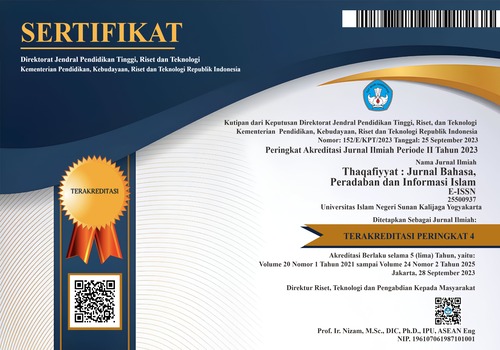BUDAYA POPULER DI KALANGAN SANTRI PUTRI DALAM PERSPEKTIF FIKIH KONTEMPORER (STUDI KASUS DI KOMPLEKS “R2” PP. AL-MUNAWWIR KRAPYAK YOGYAKARTA)
DOI:
https://doi.org/10.14421/thaq.2015.%25xAbstrak
Nowadays popular culture has become trend among the society
in all classes and also for cottage “pesantren”. This article is the result of
popular culture praxis in pesantren PP. Al-Munawwir building “R2”. The
purpose of this research is to elaborate and to know the values of popular culture among women santri and the receipt of causative factors of popular culture among the students. The researcher uses qualiltative-phenomenology in the field. Triangulation is used to collect the data with several steps; observation, interview, and documentation. Based on the contemporer fiqh and maslahah, the result of the research can be concluded that the popular culture which happened among the women students at the building “R2” has values of maslahah covers three levels, they are: D}aruruyyah, H}ajiyyah, dan Tah}siniyyah. Furthermore, contemporer fiqh prespective can explain that popular culture which happened not exceeded from the limit and not over the maximum limit of ethics and roles that has been implemented by the pesantren.
Keywords: Popular culture, santri, maslahah, and contemporer fiqh
Unduhan
Referensi
Unduhan
Diterbitkan
Terbitan
Bagian
Lisensi
Authors who will publish with this journal agree to the following terms:
- Thaqafiyyat: Jurnal Bahasa, Peradaban dan Informasi Islam publishes all articles entirely in full text.
- It is permissible for readers to download and to use it for scientific purposes and scientific dissemination.
- Authors retain copyright and grant the journal right of first publication with the work simultaneously licensed under a Creative Commons Attribution License that allows others to share the work with an acknowledgement of the work's authorship and initial publication in this journal.
- Authors are able to enter into separate, additional contractual arrangements for the non-exclusive distribution of the journal's published version of the work (e.g., post it to an institutional repository or publish it in a book), with an acknowledgement of its initial publication in this journal.
- Authors are permitted and encouraged to post their work online (e.g., in institutional repositories or on their website) prior to and during the submission process, as it can lead to productive exchanges, as well as earlier and greater citation of published work.










